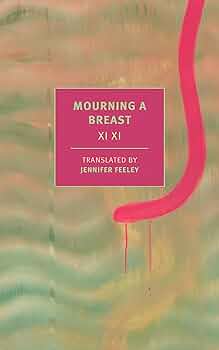July 2024: Xi Xi 西西
 Xi Xi (1937–2022) was born in Shanghai and moved to Hong Kong in 1950. Over the course of her career, she wrote several books of fiction, poetry, and nonfiction, as well as numerous screenplays and newspaper and magazine columns. In 2019, she became the first writer from Hong Kong to win Newman Prize for Chinese Literature, and her literary career was the subject of the 2015 documentary film My City. Upon its initial publication in Taiwan in 1992, Mourning a Breast was named by the China Times as one of the best ten books of the year.
Xi Xi (1937–2022) was born in Shanghai and moved to Hong Kong in 1950. Over the course of her career, she wrote several books of fiction, poetry, and nonfiction, as well as numerous screenplays and newspaper and magazine columns. In 2019, she became the first writer from Hong Kong to win Newman Prize for Chinese Literature, and her literary career was the subject of the 2015 documentary film My City. Upon its initial publication in Taiwan in 1992, Mourning a Breast was named by the China Times as one of the best ten books of the year.
This month we're delighted to be featuring a chapter from Mourning A Breast, by the titan of Hong Kong literature, Xi Xi, to coincide with the publication of Jennifer Feeley's translation of the book, out now from New York Review Books. You can read it in Chinese here, and in Jennifer's English translation here.
 Digestible as both a novel and a collection of essays, this warmly delivered work of autobiographical fiction spans Xi Xi’s diagnosis with breast cancer to her mastectomy and subsequent recovery. The book opens with Xi Xi contemplating the new open floor plan of the changing room at her local swimming pool, where she and the women around her shy from undressing in front of their peers. Later, Xi Xi escapes from her traumatic hospital experiences by evaluating different translations of Madame Bovary during the surgery and coming to terms with her changing body through the prose of Sima Qian, Susan Sontag, and Simone de Beauvoir, in addition to ancient Chinese tales such as the Book of Songs, Dreams of the Red Chamber, and Farewell My Concubine. These literary allusions ossify into an armour separating her from her cancer; still, it is through such interactions that she begins to understand her body’s language.
Digestible as both a novel and a collection of essays, this warmly delivered work of autobiographical fiction spans Xi Xi’s diagnosis with breast cancer to her mastectomy and subsequent recovery. The book opens with Xi Xi contemplating the new open floor plan of the changing room at her local swimming pool, where she and the women around her shy from undressing in front of their peers. Later, Xi Xi escapes from her traumatic hospital experiences by evaluating different translations of Madame Bovary during the surgery and coming to terms with her changing body through the prose of Sima Qian, Susan Sontag, and Simone de Beauvoir, in addition to ancient Chinese tales such as the Book of Songs, Dreams of the Red Chamber, and Farewell My Concubine. These literary allusions ossify into an armour separating her from her cancer; still, it is through such interactions that she begins to understand her body’s language. - NYRB
And there's another extract from Lit Hub here.
When I left the hospital, it felt as though I’d picked up my own body from the hospital bed and brought it home. Now, it was left to me to take care of it. Before this, I never really knew I had a body. The books I’d read had focused on caring for the soul. As a result, the body was completely set aside, and while my soul had seemingly made no progress, my body had secretly deteriorated. The body is very strange: If it doesn’t cause problems, doesn’t give you a bit of pain, doesn’t give you some stimulation, then you don’t pay any attention to it.
